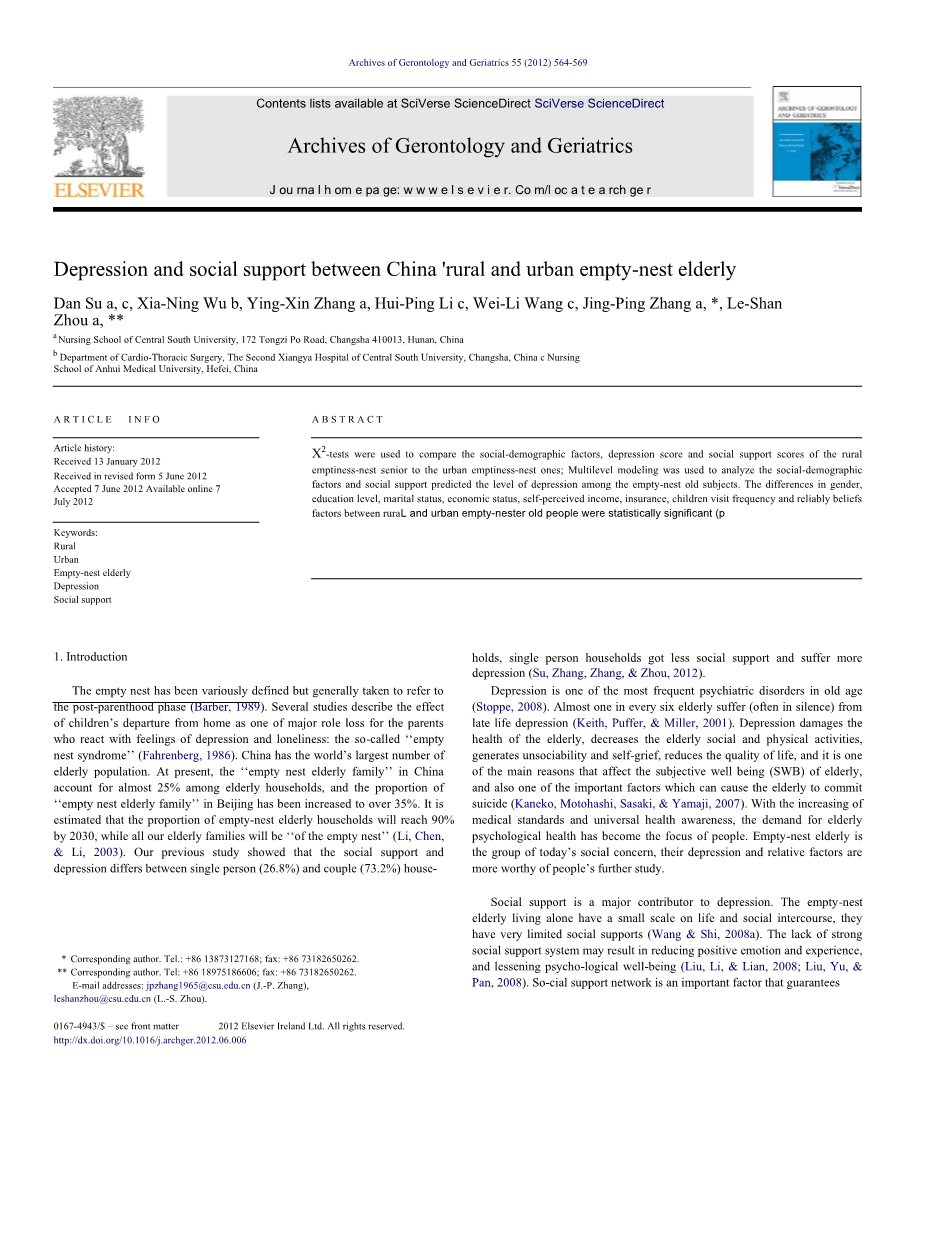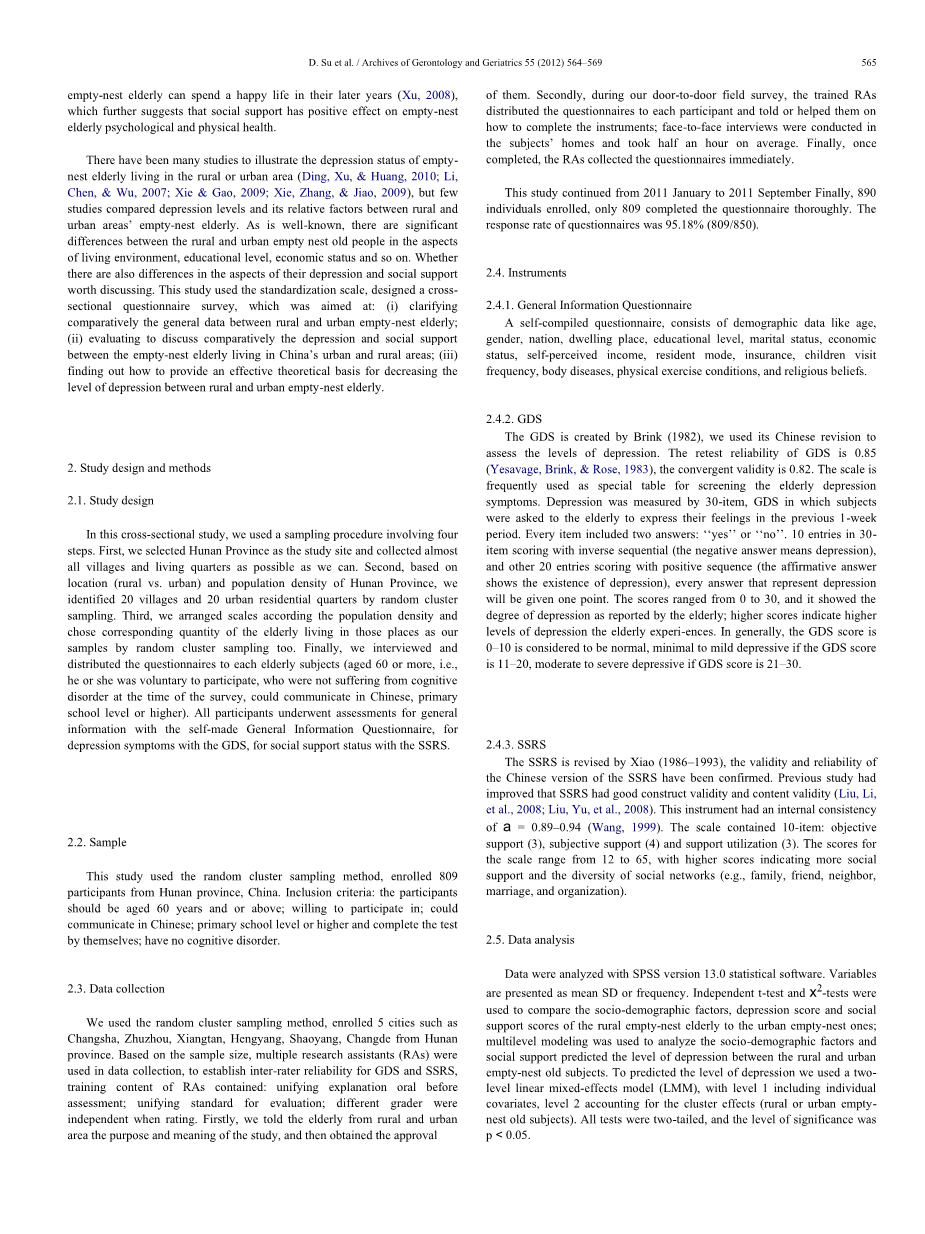

英语原文共 6 页,剩余内容已隐藏,支付完成后下载完整资料
目录
英文原文
Depression and social support between China rural and urban empty-nest elderly(节选)
Introduction
The empty nest has been variously defined but generally taken to refer to the post-parenthood phase (Barber, 1989). Several studies describe the effect of childrenrsquo;s departure from home as one of major role loss for the parents who react with feelings of depression and loneliness: the so-called “empty nest syndrome”. China has the worldrsquo;s largest number of elderly population. At present, the “empty nest elderly family” in China account for almost 25% among elderly households, and the proportion of “empty nest elderly family” in Beijing has been increased to over 35%. It is estimated that the proportion of empty-nest elderly households will reach 90% by 2030, while all our elderly families will be “of the empty nest”. Our previous study showed that the social support and depression differs between single person (26.8%) and couple (73.2%) house-holds, single person households got less social support and suffer more depression.
Depression is one of the most frequent psychiatric disorders in old age . Almost one in every six elderly suffer (often in silence) from late life depression. Depression damages the health of the elderly, decreases the elderly social and physical activities, generates unsociability and self-grief, reduces the quality of life, and it is one of the main reasons that affect the subjective well being (SWB) of elderly, and also one of the important factors which can cause the elderly to commit suicide. With the increasing of medical standards and universal health awareness, the demand for elderly psychological health has become the focus of people. Empty-nest elderly is the group of todayrsquo;s social concern, their depression and relative factors are more worthy of peoplersquo;s further study.
Social support is a major contributor to depression. The empty-nest elderly living alone have a small scale on life and social intercourse, they have very limited social supports. The lack of strong social support system may result in reducing positive emotion and experience, and lessening psycho-logical well-being. Social support network is an important factor that guarantees empty-nest elderly can spend a happy life in their later years, which further suggests that social support has positive effect on empty-nest elderly psychological and physical health.
There have been many studies to illustrate the depression status of empty-nest elderly living in the rural or urban area, but few studies compared depression levels and its relative factors between rural and urban areasrsquo; empty-nest elderly. As is well-known, there are significant differences between the rural and urban empty nest old people in the aspects of living environment, educational level, economic status and so on. Whether there are also differences in the aspects of their depression and social support worth discussing. This study used the standardization scale, designed a cross-sectional questionnaire survey, which was aimed at: (i) clarifying comparatively the general data between rural and urban empty-nest elderly; (ii) evaluating to discuss comparatively the depression and social support between the empty-nest elderly living in Chinarsquo;s urban and rural areas; (iii) finding out how to provide an effective theoretical basis for decreasing the level of depression between rural and urban empty-nest elderly.
Study design and methods
1. Study design
In this cross-sectional study, we used a sampling procedure involving four steps. First, we selected Hunan Province as the study site and collected almost all villages and living quarters as possible as we can. Second, based on location (rural vs. urban) and population density of Hunan Province, we identified 20 villages and 20 urban residential quarters by random cluster sampling. Third, we arranged scales according the population density and chose corresponding quantity of the elderly living in those places as our samples by random cluster sampling too. Finally, we interviewed and distributed the questionnaires to each elderly subjects (aged 60 or more, i.e., he or she was voluntary to participate, who were not suffering from cognitive disorder at the time of the survey, could communicate in Chinese, primary school level or higher). All participants underwent assessments for general information with the self-made General Information Questionnaire, for depression symptoms with the GDS, for social support status with the SSRS.
2. Sample
This study used the random cluster sampling method, enrolled 809 participants from Hunan province, China. Inclusion criteria: the participants should be aged 60 years and or above; willing to participate in; could communicate in Chinese; primary school level or higher and complete the test by themselves; have no cognitive disorder.
3. Data collection
We used the random cluster sampling method, enrolled 5 cities such as Changsha, Zhuzho
剩余内容已隐藏,支付完成后下载完整资料
资料编号:[254342],资料为PDF文档或Word文档,PDF文档可免费转换为Word
您可能感兴趣的文章
- 通过在消费者心中树立品牌关系导向来提高酒店品牌绩效外文翻译资料
- “友好“抱怨行为:走向亲密的手段外文翻译资料
- 服务蓝图:针对关键服务流程的有效方法-在四星级国际酒店Arash Shahin 管理部进行案例研究外文翻译资料
- 组织中女性高管职业生涯规划与晋升的视角:连锁性别偏见的经验,双重束缚,和不成文的晋升规则外文翻译资料
- 影响优秀员工工作满意度的激励因素识别外文翻译资料
- 探索离职意向的影响因素:以豪华酒店员工为例外文翻译资料
- 新冠肺炎疫情下,中国酒店旅游业面临的挑战与机遇外文翻译资料
- 酒店Twitter账号的营销效果:以沙特阿拉伯为例外文翻译资料
- 酒店旅游市场营销外文翻译资料
- 中国经济型酒店SWOT分析外文翻译资料


